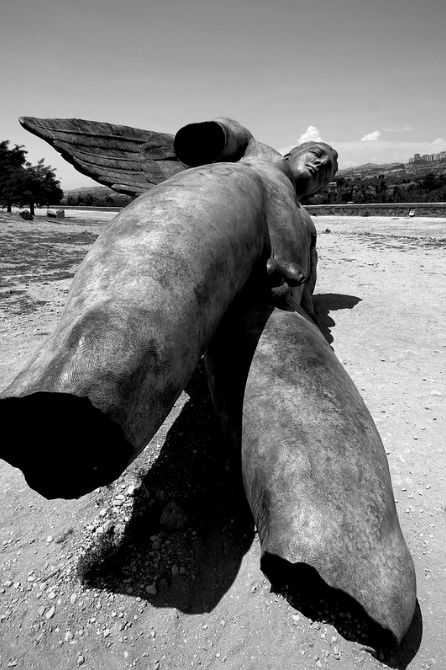In the heart of Sicily, amidst the ancient ruins of Agrigento, stands a poignant work of art that transcends time and mythology—the Fallen Icarus statue. Crafted from bronze, this modern sculpture is not only a visual masterpiece but also a powerful reflection on human ambition, pride, and the consequences of overreach. Placed in front of the Concordia Temple, one of the most iconic and well-preserved ancient Greek temples, the statue offers a deeper narrative of human nature through the lens of Greek mythology. But what makes this piece truly captivating is how it ties into the greater historical and cultural significance of its surroundings.
A Mythological Echo: Icarus and His Fall
The story of Icarus, told in Greek mythology, is one of flight, freedom, and tragic failure. Icarus, the son of Daedalus, the master craftsman, was given wings made of feathers and wax to escape the labyrinth of Crete. His father warned him not to fly too high, as the sun’s heat would melt the wax, nor too low, as the sea’s moisture could dampen the feathers. However, overwhelmed by the thrill of flight, Icarus soared higher and higher, ignoring his father’s advice. The sun’s heat melted his wings, and he plunged into the sea.
The Fallen Icarus statue captures this critical moment of human downfall—a visual reminder of the consequences of ambition unchecked by wisdom. The artist’s choice of bronze, a material that carries its own weight of history, enhances the sense of timelessness, as Icarus’s fall represents an eternal human story. The sculpture not only evokes the tragedy of the myth but also speaks to the broader themes of human arrogance, pride, and the inherent vulnerability of the human condition.

A Symbol of Human Resilience and Fragility
Placed before the Concordia Temple, the Fallen Icarus is more than a depiction of a myth; it becomes a symbolic intersection between ancient wisdom and modern reflection. The Concordia Temple, built in the 5th century BCE, stands as one of the finest examples of ancient Greek architecture in Sicily, its Doric columns towering above the surrounding ruins. The temple was originally dedicated to the goddess Hera and, like many Greek temples, embodied a sense of divine order and harmony.
In contrast, the Fallen Icarus statue speaks to the unpredictability of human fate, presenting a stark juxtaposition to the timeless perfection of the temple. Whereas the temple represents the balance and ideals of classical civilization, the statue of Icarus reminds us of the risks that come with unrestrained human desire, ambition, and the pursuit of glory.
The tragedy of Icarus also highlights human vulnerability. Just as the wax wings melted under the power of the sun, human achievements can be undone by forces beyond control. The lesson here is not just about failure but about the fragility of life itself—a reminder that no matter how advanced or accomplished we become, we are still subject to the natural laws of the universe.
The Timeless Appeal of Agrigento
Agrigento, with its rich Greek heritage, is an ideal backdrop for a sculpture that reflects both ancient mythology and contemporary understanding. The city, once known as Akragas, flourished in the 5th century BCE and was one of the most powerful and wealthy cities in the ancient Greek world. Today, its Valley of the Temples remains a UNESCO World Heritage site, attracting visitors from around the globe who come to witness the magnificence of ancient Greek architecture.
The Fallen Icarus statue, placed near the Concordia Temple, not only connects with the mythological past but also serves as a bridge between ancient and modern sensibilities. The statue is a modern interpretation, yet its message remains deeply rooted in classical themes: the tension between human ambition and the forces of nature, the peril of overreach, and the fragility of life.

A Timeless Lesson
The Fallen Icarus is not merely a work of art; it is a meditation on the human experience. It challenges us to reflect on our own ambitions and the limits of our capabilities. In a world where striving for greatness often leads to unexpected consequences, the statue of Icarus serves as a poignant reminder of the delicate balance between ambition and humility.
Placed in front of the Concordia Temple, the statue offers visitors more than just a glimpse into Greek mythology—it provides a timeless reflection on the nature of human desire, the risks we take, and the inevitable falls we may encounter. Through the myth of Icarus, we are reminded of the beauty and peril that come with reaching for the sky, and the fragility that defines our shared human journey.
